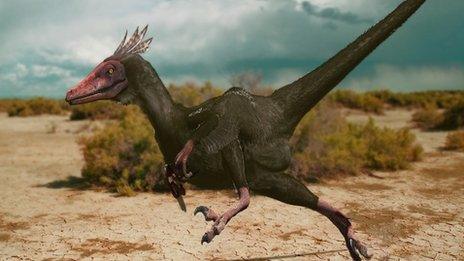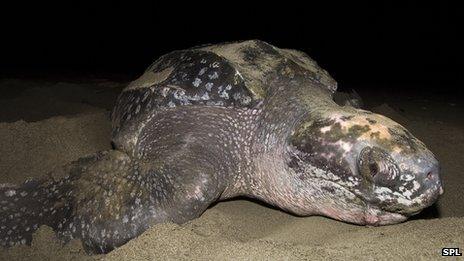Why such a fuss about extinction?
- Published
- comments

Would the world be better if velociraptors still existed?
What is wrong with extinction? I realise this question is the conservation equivalent of a landmine - or an elephant trap. And that it is likely to ruffle a lot of fur.
But I ask because I am merely wondering whether we sometimes forget a grim reality of the story of life on Earth - that extinction has always been with us.
In fact, it has quite often been good for us.
We are certainly far better off without velociraptors slashing their way through our cities. Our streets are safer with no sabre-toothed tigers. And imagine trying to swat one of those monster prehistoric insects like a vulture-sized dragonfly.
The question of extinction most recently surfaced at the talks on the Convention on International Trade in Endangered Species of Wild Fauna and Flora (CITES) - the treaty meant to save endangered species from the devastating effects of trade.
The slaughter of rhino, the decimation of elephant, the forlorn last stand of the tiger - all had their profiles raised as the delegates in Bangkok negotiated their fate.
And anyone hearing the protests and the campaigns, and the shocking statistics about the losses, might be forgiven for thinking that extinction was some new kind of evil that was not invented until rapacious and uncaring mankind came along.
I should state right now that some of the most ghastly examples are indeed entirely the result of man's activities, sometimes unwittingly, sometimes carelessly.
Natural order
However, taking a long view, extinction has been part of the natural order of things throughout Earth's history.
The most famous mass wipe-out was the loss of the dinosaurs. And four other great die-offs have been identified - one of them killing off something like 90% of species.
But there is so-called "background" extinction as well - species fading out year by year, creatures quietly losing out to others and disappearing. These losses might not be spectacular - in fact, they're routine.
The result is that the average species only lasts a few million years. Mammals do worst, surviving between one and two million years. Clams do better at five to seven million.
A few hardy survivors - the leatherback turtle is a prime example of a sturdy design - cling on for tens of millions of years.
But the blunt truth is that the living world is a restless, churning enterprise in which nothing endures forever. Astonishingly, almost every life form that has ever existed on the planet has died out.
It is worth pausing to absorb what that means. Something like 90% - or even 99%, according to some estimates - of every kind of sea creature or land animal or insect or plant that enjoyed a spell on Earth then vanished into oblivion.
Some remains morphed into fossils and ended up on the shelves of museums. Others have left no trace.
No mourning
Charles Darwin wrote of extinction in his landmark On the Origin of Species.
For him, the process of evolution involved new species gaining ground and others losing out. He certainly did not mourn the passing of the losers.

The leatherback turtle is a great survivor
So, in the clamour to conserve a host of iconic species, is there a case for us to be more realistic about our ability to intervene? Might the awkward fact be that we can't save everything?
It is certainly the case that the creatures with the best chance are those whose looks or adorability or loveable eyes have attracted the strongest support. No-one is fighting to save the tubeworm.
But should the emphasis change if extinctions are our fault? Or, worse than that, if the losses are accelerating because of us - by tearing up habitats or causing pollution or simply slaughtering every member of a species?
There is a long list of animals whose disappearance can be blamed squarely on human actions.
I met one of them on the Galapagos Islands a few years ago - Lonesome George, external, the last giant tortoise of his species, a lumbering, sad-eyed, endearing creature.
On his home island, the plants that he and his kind depended on had been nibbled away by goats brought by sailors, while their eggs were eaten by rats that jumped from the ships. The tortoises themselves used to be carried on board to serve as living larders.
Clearly attitudes to the natural world change over time - and vary between regions.
For a poor villager in Africa, poaching an elephant for its tusks is easy money. For people in China, ivory and rhino horn are important culturally and - wrongly - medicinally.
Conservation is a fairly new idea - ivory used to be a major staple of British Empire trading.
By contrast, I found the sight of a haul of smuggled tusks in Bangkok Airport profoundly depressing. The stench was intense and a customs officer said the ivory "smelled like death".
Unintended effects

Darwin was unsentimental about extinction
So what are the arguments for resisting extinction? One is purely selfish - economics.
For example, if we fish every last tuna, thousands of people in the fishing industry will lose their jobs. Likewise, if every lion or elephant is shot, the tourist trade will suffer. Extinction can cost in hard cash.
Furthermore, there may be unintended effects from eliminating "keystone" species - the loss of one plant or creature in a food chain may affect a whole web that we depend on in some way that we have not yet understood.
In Thailand, I heard that too few tigers could mean too many deer. In turn, that would mean more destruction of vegetation with a knock-on impact on the birds and monkeys that live in the trees.
Another argument is moral - that as the most powerful species on the planet, we have an obligation not to obliterate others, especially if it is through wanton carelessness.
In other words, a mark of civilisation would be to feel responsibility for the survival of weaker species.
A final point that I find compelling is that we are the first species to have gained the remarkable knowledge that every living thing has its DNA at its heart. We all share that.
We may not like everything - ants, spiders, slugs and snakes - but we are related to them. In an extremely loose sense, they are family. And that casts the threat of extinction - and our role in it - in a very different light.
David Shukman's report What's wrong with extinction? will be broadcast in a new programme, BBC News: The Editors, starting on BBC1 on 25 March at 23:15 GMT.